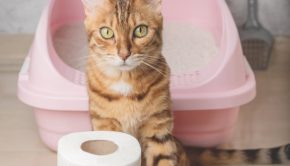Beyond Antibiotics
Pets Can Heal With Natural Approaches
by Karen Shaw Becker
Like people, pets can develop allergies to medications that are overprescribed, including antibiotics, which also have a long list of side effects—many of which are long-term. There is also the escalating problem of resistance, which is the result of too-frequent and unnecessary use of these drugs.
One of the most important things to know is that dogs and cats are exposed to antibiotics when they eat food containing the meat of factory-farmed animals, which includes about 99 percent of pet foods on the market today. The exception is a very small number that contain free-range, organic ingredients.
Antibiotic Resistance
exposed for the first time to a particular antibiotic, the majority will die, but some will survive and pass on that resistance to other bacteria. The problem is not that certain disease-causing bacteria are antibioticresistant, but that the resistance genes in any type of bacteria can transfer their ability to survive to billions of other bacteria.
This is how superbugs are born. These are a strain of bacteria able to withstand assault by multiple types of antibiotics. When a veterinarian can no longer eliminate bacterial infections with antibiotics, the life of the animal is threatened, and that’s the biggest concern.
If a veterinarian makes a diagnosis of infection, ask for a culture and sensitivity test. Otherwise, he or she is making a guess at what type of organism is present and the best antibiotic to treat it. Each time an unnecessary or inappropriate antibiotic is prescribed, the potential for resistance increases. Only in an emergency situation should a veterinarian prescribe an antibiotic before the culture and sensitivity test can be performed. The vet can then switch medications if necessary when the results arrive.
Giving the proper dose of the antibiotic at the proper intervals and using up the entire prescription is important, even if the pet seems to be fully recovered before the medication has run out. This will ensure the infection is totally resolved and prevent the pet from having to take another full course of antibiotics because the first one wasn’t fully administered and the infection wasn’t effectively cleared.
It’s important to reseed the pet’s gastrointestinal (GI) system with friendly microorganisms— probiotics—during and after antibiotic therapy to reestablish a healthy balance of gut bacteria. This will also help keep a dog or cat’s digestive system working optimally and the immune system strong.
Alternatives to Antibiotics
Many conditions for which antibiotics are often indiscriminately prescribed respond very well to a combination of natural therapies, including herbs, homeopathic remedies, nutraceuticals, immune system stimulants and specific nutritional interventions. Functional medicine veterinarians, a group that is thankfully growing in number, realize this and are able to partner with pet parents to offer alternatives to antibiotics.
A 2016 study showed cranberry extract to be as or more effective in preventing E. coli-related urinary tract infections (UTIs) in dogs as short-term antibiotic treatment. In addition, cranberry extract can help fight multidrug-resistant bacteria in dogs with recurrent E. coli UTIs.
In a study of shelter dogs, researchers compared the use of probiotics to antibiotics to treat acute diarrhea caused by stress. They concluded probiotic therapy was as effective as antibiotic therapy. In addition, dogs that were unresponsive to antibiotics appeared to benefit significantly from subsequent probiotic treatment.
Oregano oil, propolis, olive leaf, essential oils, colloidal silver and Manuka honey help reduce bacterial skin infections caused by methicillin-resistant staphylococcus aureus (MRSA) with good success.
If a dog or cat isn’t facing a lifethreatening health situation, talk with the veterinarian about alternatives to antibiotics. In these situations, pet parents often find it beneficial to consult a functional medicine or integrative veterinarian whose goal is to treat these problems by starting with the least toxic options first.
Karen Shaw Becker is a proactive, integrative doctor of veterinary medicine who consults internationally and writes for Mercola Healthy Pets (HealthyPets.Mercola.com).
savitskaya iryna/Shutterstock.com




























